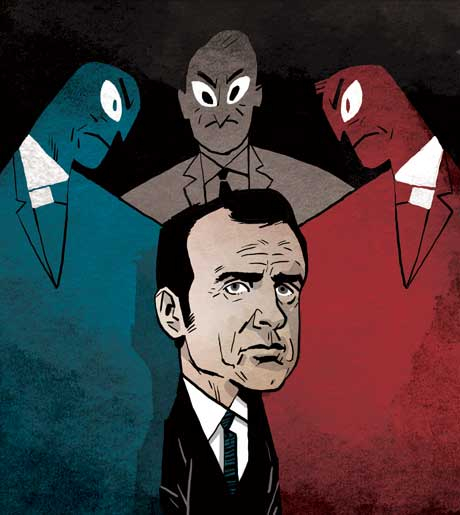Many observers felt judicious, a few weeks ago, to explain how much French President Emmanuel Macron had disappointed his electors, how little he had achieved during his first 100-days in office and how far he went down in opinion polls (from a 64-per cent approval rating to 40 per cent).
There is no serious reason why a newly-elected leader should be judged just after 100 days, especially when looking at a team that, despite technical weaknesses, was nevertheless been able to pass a few laws in record time: A campaign promise about ‘moralisation in political life’ and more importantly, a mechanism that will allow the government to pass ordinances in the labour sector without having to waste time in endless debates in parliament.
The idea, therefore, is not to write a blank cheque in favour of Macron, but to let him show the French what he can actually achieve (or not) during his term.
Coming from literally nowhere, this gentleman was able to turn the tables on his more accomplished rivals in French politics in less than 12 months, despite a hazy project aimed at making everybody happy. Nobody viewed him as a likely winner of the presidential election and even more astounding, nobody thought he could successively win a majority in parliament.
There are many reasons for that — including the pitiful and pathetic campaign orchestrated by the socialists against the conservative candidate Francois Fillon. But the least one can do today, certainly, is to let Macron gain his spurs.
Even though he did not stay unemployed in these last months (a heavy international schedule ensured that he attended the G20 gathering and provoked a series of fruitful encounters with German Chancellor Angela Merkel, Russian President Vladimir Putin and United States President Donald Trump), the bulk of the task stays ahead.
Maybe, some recent actions need to be clarified — for instance, Macron resetting a genuine French diplomacy of practising the ‘windscreen wiper’ strategy, whereby one event swiftly substitutes another, as former French presidents Nicolas Sarkozy and Francois Hollande used to do. A recent meeting in Paris with representatives from Italy, Germany and some of the African countries, on handling the issue of migrants, is indeed a positive sign. Making judgements at this stage would thus be unfair, especially when looking at where the critics come from.
On the extreme-left, the Chavez-like guerrilla Jean-Luc Melenchon has been repeatedly calling for a revived “French Revolution”. Because he speaks good French and is an educated person, Melenchon has become the darling of a French press.
Yet, it remains a fact that together with his Communist allies, Melenchon is a running disaster for whoever is not a fan of Venezuela and its President Nicolas Maduro’s inspired policy.
On the right side, the picture is not more brilliant. Fillon has left politics to join a private equity fund and consequently, second-rung leaders have started to fight in order to win the presidency of the ‘Les Republicains’ political party, next autumn. Some “great elders” go on playing gurus whereas, in fact, they aren’t good at anything.
Obviously, former French prime minister Alain Juppe did not yet understand why he lost the ‘primaries’. As to the far right, it seems to be on the verge of collapse, with its ‘natural’ leader, Marine Le Pen, looking less and less ‘natural’, and the contents of its programme, more confused than ever — noteably on the Euro.
Last but not least, the centrist’s ‘official’ ally, Francois Bayrou, who, together with partners, was not able to keep his ministerial portfolio for more than one month owing to ethical issues, is also joining the band of whistlers — with the exception that in this case, nobody cares.
In the end, the situation would not be all that positive for Macron. He is the one who has been mainly exposed in these last few weeks (to which add some mistakes of his own, such as the clumsy removal of the army’s chief-of-staff).
Hostilities started on August 31 with the proposal for a new labour law, while labour unions were on the streets on September 12. Macron cannot afford to go wrong now, though one would like to reaffirm that it is still early days to pass a final judgement on his presidency.
Luc Debieuvre is a French essayist and a lecturer at Iris (Institut de Relations Internationales et Strategiques) and the ‘Faco’ Law University of Paris.











